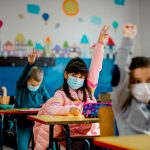“School assignments that a student is expected to do outside of the regular school day—that’s homework,” says Sandra Chafouleas, a UConn Board of Trustees Distinguished Professor of Educational Psychology. “The general guideline is 10 minutes of nightly homework per grade level beginning after kindergarten. This amounts to just a few minutes for younger elementary students to up to 2 hours for high school students.”
A year ago, we were wondering when the vaccine would be available and is it really safe to return to school? Today, those questions are still relevant! This hour, we talk about the mental health needs of students. What sort of support will children need from their schools? Sandra Chafouleas, a Board of Trustees Distinguished Professor of Educational Psychology and co-director of the Collaboratory on School and Child Health at the University of Connecticut, is interviewed.
“As many schools in the U.S. figure out how to safely and fully resume in-person instruction, much of the focus is on vaccinations. But there’s another type of ‘vaccine’ that may be beneficial for some returning K-12 students that could be overlooked. Those are known as ‘behavioral vaccines.'”
Sandra Chafouleas, Board of Trustees Distinguished Professor and Neag Endowed Professor of educational psychology and founder of the Collaboratory on School and Child Health (CSCH), spoke with Julie Bartucca of the UConn 360 podcast about ways parents can support their children’s well-being during this time, as well as about how to talk to kids about the upheaval going on in the U.S.
A group of researchers from the University of Connecticut’s Neag School of Education and UConn School of Medicine have received a $1 million grant from the Office of Special Education Programs to develop training for master’s students to address this problem. Professors Lisa Sanetti, Sandra Chafouleas, and Mary Beth Bruder have developed Interdisciplinary Preparation in Integrated and Intensive Practices (I3-PREP). The project is a multidisciplinary effort supported by UConn’s Institute for Collaboration on Health, Intervention, and Policy (InCHIP), the Neag School of Education, the UConn School of Medicine.


